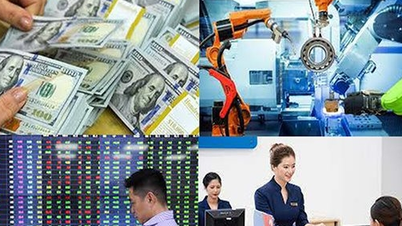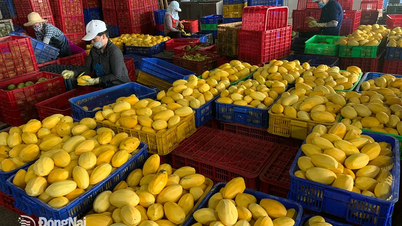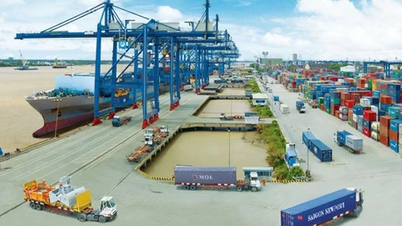This year, although the economy continues to face many unpredictable challenges, the growth prospects of the banking industry are still considered positive. Some banks have even set ambitious growth targets, aiming for record profits and setting new milestones.
Banks are very sensitive to macroeconomic fluctuations.
The first quarter of 2025 has recorded many adverse fluctuations in the global financial market, notably the trend of increasing USD interest rates and risks related to exchange rates, creating significant pressure on capital costs and liquidity of credit institutions. Being a sector sensitive to macroeconomic fluctuations, the Vietnamese banking system is unlikely to avoid the spillover effects from the international environment.
Domestically, banks are facing the problem of increasing input mobilization costs, while customers increasingly demand high-yield products with value-added services. Increasingly fierce competition from non-bank financial institutions and financial technology companies (fintech) also poses significant challenges to the industry's sustainable growth goals.
At recent annual general meetings of shareholders, many commercial banks have frankly acknowledged that the domestic and foreign economic environment is fraught with many uncertain factors, putting great pressure on the implementation of the 2025 business plan - especially in achieving profit targets.
At Eximbank’s General Meeting of Shareholders, Chairman of the Board of Directors Nguyen Canh Anh emphasized: “The banking industry is very sensitive to macroeconomic fluctuations. The increase in USD interest rates along with exchange rate instability has pushed up input costs, putting significant pressure on banks’ profit margins. In that context, the top priority is to control risks and optimize capital structure.”
Similarly, LPBank representatives also assessed that the impact of the new US tax policy could directly affect export activities - a sector that plays a driving role in the Vietnamese economy. Vice Chairman of the Board of Directors Bui Thai Ha shared: "Although the proportion of outstanding debt related to export enterprises at LPBank is still limited, we have proactively established a separate bad debt handling company to promptly respond to all risk scenarios."
VPBank's leader, Mr. Nguyen Duc Vinh - General Director, also said that the US's retaliatory tax policy is an unpredictable variable, and affirmed that the bank is closely monitoring international developments to promptly adjust business plans and develop appropriate response scenarios in the context of increasing pressure from both the global and domestic economies.
Many business plans that were developed at the beginning of the year – before trade tensions – are now becoming more difficult to implement than originally anticipated. In this situation, credit institutions are forced to review their operating plans, strengthen their risk management capacity, and prepare flexible solutions to respond to international tariff policies if they officially take effect in the second half of the year.
At VietBank, the board of directors is also under great pressure when setting a profit growth target of 55% in 2025. The bank representative said that they are urgently reviewing the entire business plan to adjust it to the new, volatile and challenging economic context.

Double-digit profit growth target
By the end of April 2025, most commercial banks had completed their annual general meetings of shareholders and approved their 2025 business plans with a double-digit profit growth target. Through the synthesis of results from general meetings of shareholders held during the month, most banks still maintained their profit growth target of 10% or more. Some banks set an ambition of 20-30% growth, expecting momentum from high credit growth, diversifying revenue sources and promoting digitalization to control costs more effectively.
Some financial institutions set profit targets that increased sharply compared to the previous year. For example, LPBank set a pre-tax profit target of more than VND14,800 billion, an increase of more than 22%, along with a credit growth plan of nearly 16% and a total asset increase of about 3.5%. In the first quarter, this bank recorded a pre-tax profit of more than VND3,100 billion, an increase of more than 10% over the same period. Eximbank also expects pre-tax profit to exceed VND5,100 billion, an increase of nearly 24% compared to 2024, while adjusting its credit growth target to more than 16% and capital mobilization to 15.5%. This bank plans to control the bad debt ratio to below 2%.
VPBank attracted attention when it set a pre-tax profit target of nearly VND25,300 billion - the highest level ever, up 26% compared to 2024. Most of the profit comes from the parent bank, in addition to positive contributions from member companies in the fields of consumer finance, securities and insurance.
Banks are consistent in their view that growth must go hand in hand with quality, not at all costs. LPBank representative said: “We do not expand outstanding loans at all costs, but prioritize choosing safe customer segments with good risk tolerance.”
In addition, many banks are actively restructuring their credit portfolios, accelerating the digitalization process, and streamlining their organizational structure to improve operational efficiency and reduce costs. At the same time, they are promoting the development of non-interest income sources such as banking services, bancassurance, and foreign exchange to reduce dependence on traditional credit activities.
To realize their growth targets, banks said they would focus on streamlining internal processes, enhancing risk control, and selecting appropriate customer segments. Some banks emphasized the orientation of prioritizing quality customers, strictly controlling credit, and improving management capacity in the context of pressure from interest rate competition and tax policies that still exist.
Source: https://baodaknong.vn/kinh-te-doi-dien-voi-nhieu-thach-thuc-loi-nhuan-nganh-ngan-hang-van-duoc-ky-vong-tang-manh-251153.html


![[Photo] General Secretary To Lam works with the Central Policy and Strategy Committee](https://vphoto.vietnam.vn/thumb/1200x675/vietnam/resource/IMAGE/2025/5/28/7b31a656d8a148d4b7e7ca66463a6894)
![[Photo] Prime Minister Pham Minh Chinh receives a bipartisan delegation of US House of Representatives](https://vphoto.vietnam.vn/thumb/1200x675/vietnam/resource/IMAGE/2025/5/28/468e61546b664d3f98dc75f6a3c2c880)

![[Photo] 12th grade students say goodbye at the closing ceremony, preparing to embark on a new journey](https://vphoto.vietnam.vn/thumb/1200x675/vietnam/resource/IMAGE/2025/5/28/42ac3d300d214e7b8db4a03feeed3f6a)
![[Photo] Vietnamese and Hungarian leaders attend the opening of the exhibition by photographer Bozoky Dezso](https://vphoto.vietnam.vn/thumb/1200x675/vietnam/resource/IMAGE/2025/5/28/b478be84f13042aebc74e077c4756e4b)



















































































Comment (0)